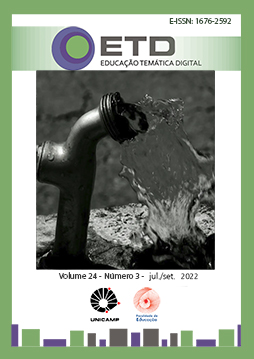Abstract
In this text, in which the object of investigation are the teaching-learning strategies involving digital technologies in Higher Education, a qualitative study is presented through a survey survey, in which students of the Didactics discipline, developed in 2020, participated. first semester, at the federal public university. When approaching this object, the discussions involve analyzes about digital culture, hyperconnectivity, information society and constituted in a network. The potential of digital technologies for education is problematized, but also the need to recognize their limits, evidenced in an unequal society such as Brazil. Furthermore, the results of a questionnaire are presented, interspersed with reflections on the teaching-learning process, considering the specificities of suspension of face-to-face activities. The results indicate a positive return on the composition of the discipline through the Virtual Learning Environment and its contribution to the formation of students as undergraduates. The proposal that is carried out is the construction of a new educational paradigm, based on Moreira and Schlemmer (2020), very appropriate in the sense of transcending the presence and rescuing an education aligned with the current historical, cultural and social time.
References
AZZI, Sandra. Trabalho docente: autonomia didática e construção do saber pedagógico. In: PIMENTA, Selma Garrido (Org.). Saberes pedagógicos e atividade docente. 8.ed. São Paulo: Cortez, 2012. p. 39-72.
BABBIE, Earl. Métodos de Pesquisas de Survey. Tradução Guilherme Cezarino. Belo Horizonte: Ed. UFMG, 1999.
BARRON, Brigid. Interest and self-sustained learning as catalysts of development: a learning ecology perspective. Human Development. Oct., p. 193-224, 2006.
BRASIL. Lei n° 9.394, de 20 de dezembro de 1996. Brasília: Senado Federal, 20 de dezembro de 1996.
BRASIL. Conselho Nacional de Educação. Parecer n° 05, de 28 de abril de 2020. Brasília: Sala das Sessões, 28 de abril de 2020.
CARVALHO, Leandro. Governo Juscelino Kubitschek (JK). Brasil Escola. 2021. Disponível em: https://brasilescola.uol.com.br/historiab/juscelino-kubitschek.html. Acesso em: 08 maio 2021.
CARVALHO, Ana Beatriz Gomes. A WEB 2.0, Educação a Distância e o conceito de aprendizagem colaborativa na formação de professores. In: SIMPÓSIO HIPERTEXTO E TECNOLOGIAS NA EDUCAÇÃO.
MULTIMODALIDADE E ENSINO, 2., 2008. Recife: NEHTE, 2008.
CASTELLS, Manuel. O poder da comunicação. São Paulo: Paz e Terra, 2015.
CASTELLS, Manuel. A sociedade em Rede. 18.ed. São Paulo: Paz e Terra, 2017.
COSTA, Maria Luísa Furlan; SANTOS, Renata Oliveira dos; MENDONÇA, Camila Tecla Mortean. O ensino remoto emergencial e a contribuição na formação de humanidades digitais em tempos de pandemia. Revista EducaOnline. v. 15, n.2, mai./ago. 2021.
FELIPPE, Marcio Sotelo. Pandemia: a antítese entre sociedade e mercado. In: Ética em tempos de peste. Revista Cult, Editora Bregantini, ano 23, maio 2020, ed. 257, p.56-61, 2020.
GARCIA, Tania Cristina Meira; MORAIS, Ione Rodrigues Diniz; ZAROS, Lilian Giotto; RÊGO, Diógenes Maria Carmem Freire. Ensino remoto emergencial: proposta de design para organização de aulas. Natal: SEDIS/UFRN, 2020.
GERE, Charlie. Digital culture. 2.ed. London: Reaktion Books, 2008.
GIL, Antonio Carlos. Métodos e técnicas de pesquisa social. 6.ed. São Paulo: Atlas, 2014.
KANT, Immanuel. Crítica da faculdade do juízo. Trad. Valério Rohden e Antônio Marques. 2.ed. Rio de Janeiro: Forense Universitária, 2008.
LIBÂNEO, José Carlos. Democratização da escola pública: a pedagogia crítico-social dos conteúdos. São Paulo: Loyola, 1986.
LIBÂNEO, José Carlos. Didática. 2.ed. São Paulo: Cortez, 2013.
LOIO, Milene Peixer; ESPÍNDOLA, Marina Bazzo de; CERNY, Roseli Zen; TOSATTI, Nayara Cristine Müler. A cultura da escola recontextualizando a integração das TDIC no currículo. Revista e-Curriculum, v. 18, n.2, p.636-656, abr./jun. 2020.
MORAN, José Manuel. Ensino e aprendizagem inovadores com apoio de tecnologias. In: MORAN, José Manuel; MASETTO, Marcos T.; BEHRENS, Marilda Aparecida (Org.). Novas tecnologias e mediação pedagógica. Campinas: Papirus, 2013. p.11-72.
MOREIRA, José António Marques; Eliane SCHLEMMER. Por um novo conceito e paradigma de educação digital online. Revista UFG, v. 20, 2020. Acesso em 06 mai. 2021.
MOREIRA, José António Marques; HENRIQUES, Susana; BARROS, Daniela. Transitando de um ensino remoto emergencial para uma educação digital em rede, em tempos de pandemia. Revista Dialogia, São Paulo, n. 34, p. 351-364, jan./abr. 2020.
PEIXOTO, Joana. Relações entre sujeitos sociais e objetos técnicos: uma reflexão necessária para investigar os processos educativos mediados por tecnologias. Revista Brasileira de Educação. v. 20, n. 61, p. 317-332, 2015.
PERONI, Vera. Política educacional e papel do Estado. São Paulo: Xamã, 2003.
PIMENTA, Selma Garrido. Formação de professores: identidade e saberes da docência. In: PIMENTA, Selma Garrido (Org.). Saberes pedagógicos e atividade docente. 8.ed. São Paulo: Cortez, 2012. p. 15-38.
RAMOS, Geraldo Falci Júnior. Metodologia de mineração de dados para ambientes educacionais online. 2010, 61 f. Dissertação (Mestrado em Engenharia Elétrica) - Faculdade de Engenharia Elétrica e de Computação, Universidade Estadual de Campinas, São Paulo, 2010.
SANTAELLA, Lúcia. A estética das linguagens líquidas. In: SANTAELLA, Lúcia; ARANTES, Priscila. Estéticas tecnológicas: novos modos de sentir. São Paulo: Educ, 2008. p.35-55.
SAVIANI, Demerval. Escola e democracia. 42.ed. São Paulo: Cortez/Autores Associados, 2012.
SIBILIA, Paula. Entre redes ou paredes a escola em tempos de dispersão. Rio de Janeiro: Contraponto, 2012.
ZADUSKI, Jeong Cir Deborah. Design de um Ecossistema Virtual de Aprendizagem Internacional para a Inclusão. Tese (doutorado) - Universidade Estadual Paulista (Unesp), Faculdade de Ciências e Tecnologia, Presidente Prudente, 2020. 189 p.

This work is licensed under a Creative Commons Attribution-NonCommercial-NoDerivatives 4.0 International License.
Copyright (c) 2022 ETD - Educação Temática Digital


